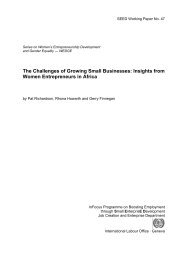Social and Solidarity Economy: Our common road towards Decent ...
Social and Solidarity Economy: Our common road towards Decent ...
Social and Solidarity Economy: Our common road towards Decent ...
Create successful ePaper yourself
Turn your PDF publications into a flip-book with our unique Google optimized e-Paper software.
SOCIAL AND SOLIDARITY ECONOMY ACADEMY<br />
of Underst<strong>and</strong>ing, defining, among other things, ILO-ICA Americas joint activities in 2012, the International<br />
Year of Cooperatives.<br />
Europe<br />
The European Parliament adopted a resolution on the social economy in 2009, 10 which recognizes SSEOs in<br />
the European Union (EU). These are represented at the EESC 11 with the “<strong>Social</strong> <strong>Economy</strong> Category” (i.e.<br />
cooperatives, mutual benefit societies, associations, foundations <strong>and</strong> social NGOs). The Council of the EU, the<br />
Committee of the Region <strong>and</strong> the European Commission conducted an initiative aiming to recognize the<br />
potential of SSEOs for economic growth, employment <strong>and</strong> citizen participation. 12 As a result, the European<br />
Commission recognized the importance of the “<strong>Social</strong> <strong>Economy</strong> in the European Union”. 13<br />
The ILO has collaborated with the EESC in many instances. The Plan of Action adopted in Johannesburg was<br />
presented at the EESC hearing on the SSE. In July 2010, the EESC adopted an opinion 14 which outlines several<br />
measures for promoting the African SSE in development cooperation, including ensuring the EU’s recognition<br />
of the SSE’s role <strong>and</strong> contribution in Africa’s development; involving SSEOs in Cotonou Agreements 15 ;<br />
integrating the SSE into the EU-Africa Partnership; recognizing the contribution of the SSE to the creation of<br />
decent jobs in Africa; including the SSE in the 2010 European Report on Development; encouraging an<br />
enabling environment for the SSE; <strong>and</strong> including the SSE in existing Commission-ILO strategic partnerships.<br />
Following the adoption of this opinion, the ILO presented its concept of the SSE <strong>and</strong> the Plan of Action<br />
adopted in Johannesburg at the African Union (AU) – EU workshop on employment <strong>and</strong> decent work (Dakar,<br />
Senegal – July 2010). The SSE concept was integrated into this AU-EU action plan.<br />
10<br />
European Parliament (2009), Report on <strong>Social</strong> <strong>Economy</strong><br />
(www.europarl.europa.eu/sides/getDoc.do?pubRef=-//EP//NONSGML+REPORT+A6-2009-0015+0+DOC+PDF+V0//EN - August 2011).<br />
11<br />
The EESC is a consultative body that gives representatives of Europe’s socio-occupational interest groups, <strong>and</strong> others, a formal<br />
platform to express their points of views on EU issues. Its opinions are forwarded to the larger institutions - the Council, the<br />
Commission <strong>and</strong> the European Parliament. Members of the EESC are drawn from economic <strong>and</strong> social interest groups in Europe (e.g.<br />
employers, employees <strong>and</strong> various interests). The presence of the various interests group, alongside the employees <strong>and</strong> employers,<br />
ensures that the Committee is able to give full voice to the concerns of the various social, occupational, economic <strong>and</strong> cultural<br />
organizations that make up civil society. This third group is constituted by farmers’ organizations, small businesses, the crafts sector,<br />
professions, cooperatives <strong>and</strong> non-profit associations, consumer organizations, environmental organizations, associations<br />
representing the family, persons with disabilities, the scientific <strong>and</strong> academic community <strong>and</strong> non-governmental organizations.<br />
12<br />
www.socialeconomy.eu.org/spip.php?rubrique181<br />
13<br />
"The set of private, formally-organized enterprises, with autonomy of decision <strong>and</strong> freedom of membership, created to meet their<br />
members’ needs through the market by producing goods <strong>and</strong> providing services, insurance <strong>and</strong> finance, where decision-making <strong>and</strong><br />
any distribution of profits or surpluses among the members are not directly linked to the capital or fees contributed by each member,<br />
each of whom has one vote. The <strong>Social</strong> <strong>Economy</strong> also includes private, formally-organized organizations with autonomy of decision<br />
<strong>and</strong> freedom of membership that produce non-market services for households <strong>and</strong> whose surpluses, if any, cannot be appropriated<br />
by the economic agents that create, control or finance them.” EESC (2006).<br />
14<br />
Cf. http://eur-lex.europa.eu/LexUriServ/LexUriServ.do?uri=OJ:C:2011:044:0129:0135:EN:PDF (August 2011).<br />
15<br />
The Cotonou Agreement is a comprehensive partnership agreement between developing countries <strong>and</strong> the European Union. Since<br />
2000, it has been the framework for the EU's relations with 79 countries from Africa, the Caribbean <strong>and</strong> the Pacific. For information,<br />
please refer to http://ec.europa.eu/europeaid/where/acp/overview/cotonou-agreement/index_en.htm<br />
xii<br />
READER

















